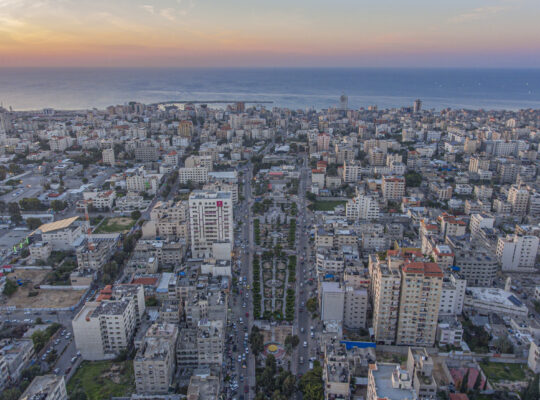Unlock the Editor’s Digest for free
Roula Khalaf, Editor of the FT, selects her favourite stories in this weekly newsletter.
French President Emmanuel Macron said the release of all hostages seized by Hamas should be the “first objective” of Israel and its allies as western capitals urged the Jewish state to allow time for negotiations and for more aid to enter Gaza before launching an expected ground offensive.
On a visit intended as an expression of solidarity with Israel following the Hamas attacks on October 7, Macron told Israeli President Isaac Herzog in Jerusalem on Tuesday that “the first objective we should have today is the release of all hostages without distinction”.
EU leaders are later this week expected to endorse a call for a “humanitarian pause” in hostilities to let more water, food and medicine into Gaza and to give more time to negotiations mediated by Qatar to secure the release of hostages. Hamas on Monday night released two more hostages of the more than 200 it abducted from southern Israel in its assault earlier this month.
US President Joe Biden spoke to Israel’s prime minister Benjamin Netanyahu late on Monday and asked him to facilitate a “continuous flow of urgently needed humanitarian assistance”, the White House said.
The UN has warned that the blockaded enclave was on the verge of running out of fuel to run hospitals and pump water through a desalination plant already functioning at reduced capacity. Only three small consignments of aid have made it across the border into Gaza from Egypt since Israeli forces besieged the strip.
Qatar’s ruler warned the international community on Tuesday not to give Israel an “unconditional greenlight” in its war with Hamas, warning that the conflict “threatens the security of the region and the world”.
Sheikh Tamim bin Hamad Al-Thani said he could not “stay tight-lipped about the unprecedented barbaric bombing of the civilians in Gaza Strip”.
In his meeting with Herzog, Macron said it was “our duty to fight against these terrorist groups without any confusion”. But he appeared to advise Israel against launching a full-scale ground invasion of Gaza to eradicate Hamas, saying: “Organising targeted operations is a necessity.”
The two elderly female hostages freed late on Monday night, Nurit Cooper, 79, and Yocheved Lifshitz, 85, were in good health, a nurse at Israel’s Ichilov hospital said. But their husbands, who were also kidnapped from the Nir Oz kibbutz, remained in Hamas’s hands, alongside more than 200 other hostages.
Hamas said they had been released “for compelling humanitarian reasons”, after it freed two American Israeli-American women to the Red Cross on Friday.
Talks to release substantially more stalled over its demands that fuel be allowed, a senior Israeli official said.
The Israel Defense Forces bombed an additional 400 targets overnight, describing them as staging grounds for rocket attacks and a tunnel that led to the Mediterranean Sea. At least 5,087 people have killed in Gaza, local health authorities said, since Israel started its bombardment of the strip in retaliation for the Hamas attack that killed at 1,400 civilians and soldiers, according to Israeli authorities.
Israeli officials have indicated that its looming ground offensive was on schedule, with the chief of the general staff saying it was using the time to prepare soldiers and shape its intended operations within Gaza.
“We are well prepared for the ground operations in the south,” said Lieutenant General Herzi Halevi. “There are tactical, operative, strategic considerations that have provided additional time, and troops who have more time are better prepared, and that is what we are doing now.”
But the success of back-channel hostage negotiations run by Qatar, aided by Egypt and facilitated by the Red Cross, complicates Israel’s hope for a large, swift ground operation aimed at rooting out Hamas’s ground infrastructure.
The Israeli official briefed on the hostage release said the release was unconditional, and that Hamas’s demands for fuel — to be delivered during a brief ceasefire — were rejected by the “political echelon”.
The EU’s chief diplomat, Josep Borrell, said on Monday that the bloc’s foreign ministers were seeking a “humanitarian pause” that would allow for more hostages to be released, and aid to enter Gaza.
Israel is blocking the entry of aid at the scale necessary for alleviating Gaza’s humanitarian crisis until a mechanism for inspections can be put into place that guarantees that no weapons or fuel enter the enclave from Egypt, said three senior UN officials. Israel also wants international monitors to ensure the aid is kept out of Hamas’s hands, the officials added.
The three aid convoys that have entered Gaza since Friday have not included fuel, which the UN said was on the verge of running out, leaving hospitals unable to save lives.
Additional reporting by Andrew England in London
Source link



